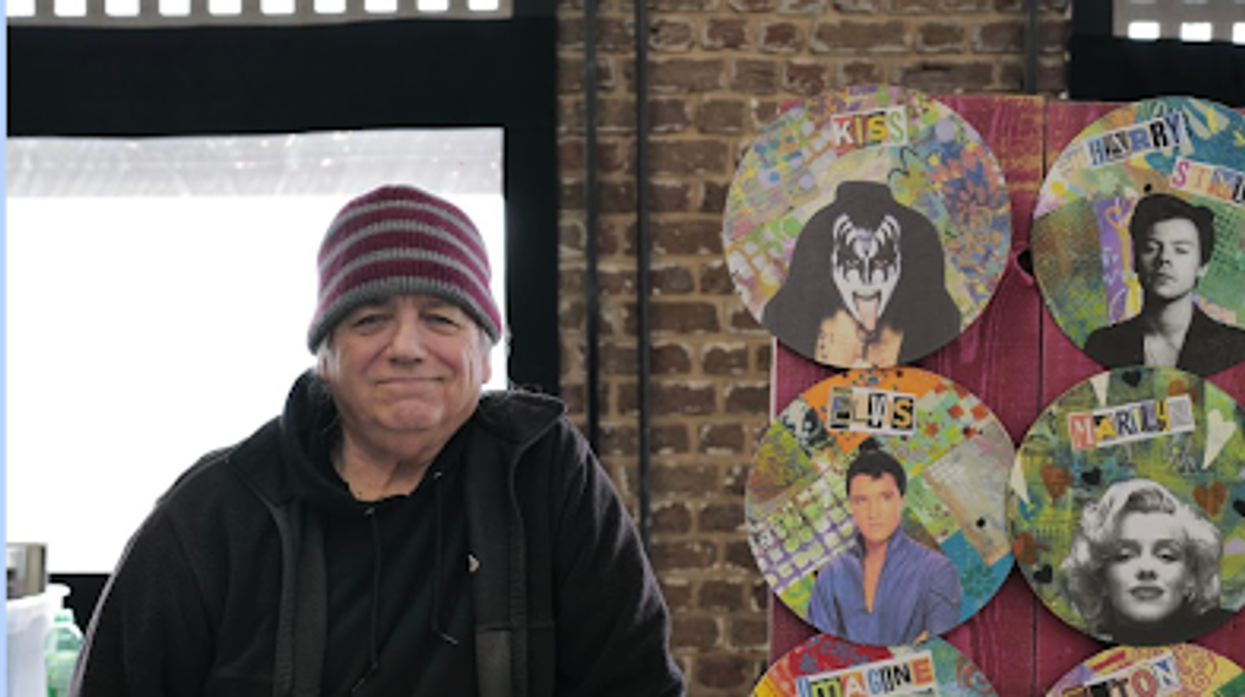Yiqing is a graduate student at Northwestern University's Medill School of Journalism.
CHARLESTON, S.C. – White Converse shoes, green work pants scattered with paint stains, black hoodie and a cowboy hat covered with dozens of rock ‘n’ roll pins. Anderson Lee Smith, a 66-year-old, 6-foot-tall man with his long, gray hair tied back in a low ponytail, dresses in a youthful style while arranging the vinyl art at his stall in the Charleston City Market.
In contrast with his artistic appearance, Smith’s political view is decidedly conservative. After spending four decades as an apolitical artist, Smith turned into a firm supporter of Donald Trump after watching the evolution of the Black Lives Matter movement. He acknowledged the tragedy of George Floyd’s death and the need to support most of the demonstrations. However, when some protests turned violent, Smith saw them as chaos and destruction to the country.
“Democrats are changing the spirit of America,” said Smith softly, while looking through a large, misty window at the market in early February.
The Black Lives Matter movement alarmed Smith, causing him to start paying attention to politics for the first time in his life. He read news and listened to podcasts. That led him to start supporting Trump. He said that the Republican ideology reminded him of the way he grew up. For him, Trump was just trying to bring the country back to normal.
“I feel like the left is trying to change all the things. I’m not afraid of change, but I’m afraid of radical change,” Smith said.
Smith’s fear of radical change is one of the essences of conservative ideology, which highlights the pursuit of a secure social structure, according to Brandt Smith, a psychology professor at Columbus State University. “Tradition is a security blanket,” he said, and people cling to traditions because they work.
Smith never thought he could care so much about politics. He has lived in Charleston his whole life and made his first foray into art when he started drawing cartoons at age 6. He worked at wood burning right after graduating from the University of South Carolina, then transitioned to painting. Six years ago, he shifted his gears to working in vinyl.
Worn-out vinyl records became his favorite medium. He collected materials from old magazines and outdated posters, cutting and pasting colorful letters onto brightly colored cardstock. Taylor Swift, Queen, Nirvana, Donald Trump and Joe Biden have been among his subjects. One of his records shows Trump with a muscular young body and a golden boxer’s belt. The text beneath him reads: “Mean tweets and cheap gas make America great again.”
“Music keeps you young, working keeps you young, and finding out young people’s music keeps you young, because I feel like I’m staying in touch,” Smith said.
While Smith values keeping up with the times, he also values tradition. For him, tradition means guns, the flag, nuclear family, a strong border – things that he thought Americans agreed constituted the spirit of America, whether they were Democrats and Republicans. (A majority of Americans want stronger gun control although nearly two-thirds believe the situation at the Southern border is a crisis or major problem.)
In his view, those traditions were violated by the looting and violence he saw on the news after Floyd’s murder, especially when people broke windows and set fire to cars.
Smith’s study found that “endorsement of hierarchies and resistance to change” are two core facets of conservative ideology. Conservatives fear changes because they want to reduce uncertainty and threat, and they generally adopt an “if it ain’t broke, don’t fix it” position.
Smith lives a simple life. He married his wife 44 years ago, right after college. They decided not to have children. Smith said that they don’t need a child to complete their lives or to prove their love. He said he doesn’t have a cell phone because the devices distract people from the real world.
On an ordinary day, Smith usually wakes up at 5:30 in the morning and arrives at the market an hour later. Since the market doesn’t open until 10 a.m., he has plenty of time to set up his stall, chat with other vendors or have a cup of coffee. After a day in the market, Smith goes home, has dinner, kisses his wife and then heads back to the studio to create more art.



















